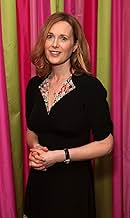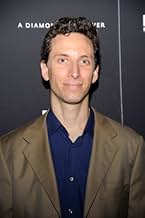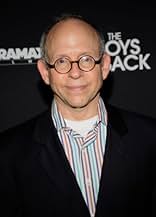CALIFICACIÓN DE IMDb
6.8/10
11 k
TU CALIFICACIÓN
Un escritor deportivo se convierte en padre soltero en circunstancias trágicas.Un escritor deportivo se convierte en padre soltero en circunstancias trágicas.Un escritor deportivo se convierte en padre soltero en circunstancias trágicas.
- Dirección
- Guionistas
- Elenco
- Premios
- 6 nominaciones en total
- Dirección
- Guionistas
- Todo el elenco y el equipo
- Producción, taquilla y más en IMDbPro
Opiniones destacadas
Clive Owen shines once again as husband and father dealing with loss. Although the story seems like the familiar one we have seen before in many films like this, the direction, script and acting really do go through the many complexities of the characters. Scott Hicks shows us how flawed the father is. Allan Cubitt's script works great because of all of Owen's input and ideas to it. The young George MacKay gives a standout performance as the teenage son dealing with many issues. George actually has the most important and revealing scene towards the end of the movie. Would definitely recommend this film.
A brilliant movie with emotions perfectly emoted by characters very well etched by the writers. That's what I would like to say about this movie in one word. The director has blended all the factors into one...be it the shots, the music, the characters, the story...all into one. And he has done it in a brilliant way that I felt that I was with those characters living with them. Clive Owen, Laura Fraser, Nicholas McAnulty, George Mackay all did a wonderful job. I did not have any expectation while going into the cinemas to watch this...and when I got out i was feeling very refreshed... A good movie...I recommend it to all.
this was a very interesting film to watch but by no means gripping. Certainly a lighter role for clive Owen after Duplicity and The International and he is of course faultless in his execution of the role as journalist Joe Carr showing great vulnerability in his relationship with women in general, notably his two wives and then his two sons Arty and Harry who live apart. There are a lot of sensitive moments and much is overplayed, though personally the death of his wife I think is not played enough and the grief of the family seems somewhat hollow to me. Laurel seemed too available and not involved enough in the story and can someone explain what the party was all bout at the house when Joe Carr was away. Who were the uninvited guests and how did they get into the house? Didn't get that at all, not at all! Another film which promises a lot but delivers little, touching on serious family issues but not really addressing them.
Going in, I had utterly no idea of what to expect from this film. My companion didn't even tell me ~what~ movie we were going to see, much less any clues to what it was about. I don't think I've ever walked into a theater with so little idea of what to expect. All I knew was that Clive Owen had a role; but he plays such diverse roles, that gave me no clues.
But, I'm sure even those who knew lot more about this movie going in were surprised. The story provides lots of unexpected and unusual moments. I would anticipate the plot would turn one way, and it would find a whole new direction of it's own. It was refreshing to see a movie that didn't try to fit a mold - that has it's own unique view, rather than fitting into a genre.
The acting was quite amazing; really wonderful believable performances all around. Main characters and minor characters were so believably portrayed that watching the movie occasionally gave me as sense of being the peeping tom.
So those are truly amazing achievements in a movie, especially these days. And yet...
"Boys" has aspects of a great movie, but, sadly, it isn't great. The underlying Peter Pan theme was a bit overplayed. It felt as though the director kept whispering in your ear, saying, "Got it? Got it, yet?"
The storyline held surprises, drama, tension, and some great comic relief... along with more than a few tediously boring scenes that let the audience fall right out of the movie (enough of the raindrops on windows!). It's always a bad sign when I check my watch during a movie, and I checked my watch way too many times in this one.
So, go see it and expect to see something special in it. The specialness is there, even if the movie sometimes dumps you out of the scene and back into your theater seat.
But, I'm sure even those who knew lot more about this movie going in were surprised. The story provides lots of unexpected and unusual moments. I would anticipate the plot would turn one way, and it would find a whole new direction of it's own. It was refreshing to see a movie that didn't try to fit a mold - that has it's own unique view, rather than fitting into a genre.
The acting was quite amazing; really wonderful believable performances all around. Main characters and minor characters were so believably portrayed that watching the movie occasionally gave me as sense of being the peeping tom.
So those are truly amazing achievements in a movie, especially these days. And yet...
"Boys" has aspects of a great movie, but, sadly, it isn't great. The underlying Peter Pan theme was a bit overplayed. It felt as though the director kept whispering in your ear, saying, "Got it? Got it, yet?"
The storyline held surprises, drama, tension, and some great comic relief... along with more than a few tediously boring scenes that let the audience fall right out of the movie (enough of the raindrops on windows!). It's always a bad sign when I check my watch during a movie, and I checked my watch way too many times in this one.
So, go see it and expect to see something special in it. The specialness is there, even if the movie sometimes dumps you out of the scene and back into your theater seat.
Going by a superficial examination of director Scott Hicks' latest human drama, The Boys are Back, it might prove incredibly difficult to envision how the story, detailing the death of a spouse, healing through father/son bonding and the struggle to balance personal and selfless agendas in life, could avoid caving to contrived Hollywood sentiment and easy storytelling cliché. However, bearing this concern in mind, Hicks' film can be seen as affirmation to the fact that real stories of loss and emotional rebirth can be told without simply succumbing to excessive saccharine convention while retaining their authenticity, as The Boys are Back fuses humour, heartbreak, power and poignancy with the greatest of ease and with a complete lack of pretension, feeling impressively real and all the more resonant because of it.
While the film could be described as a challenging watch due to its upsetting subject matter, more challenging (in an entirely positive sense) is Hicks' refusal to provide the viewer with 'easy answers' or superficial narrative or emotional closure. Rather than providing a streamlined narrative filled with requisite Hollywood exposition and filler scenes, the film appears to simply jump from scene to scene, providing a clear sense of an overarching narrative, but with more of a clunky, episodic flow, devoting nearly as much emphasis to seemingly banal scenes as Owen's character struggling to do the laundry or leisurely sequences of the boys playing (framed by the sumptuous scenery of Southern Australia)as more pivotal plot points. However, such a narrative style amplifies the sense of realism of the story, as if Hicks' cameras simply happened across the events unfolding rather than them being carefully predetermined for maximum emotional effect, as one might see in a more carefully tailored Hollywood film. Similarly, despite the superficially fragmented sense of narrative, through representing seemingly inconsequential moments interspersed with the major emotional scenes, Hicks' story paradoxically feels all the more flushed out, hinting at a much grander story looming beyond its collection of trace moments, and feeling all the more realistic and impactful because of it.
However, Hicks' film truly excels at providing moments of raw, often tear-jerking emotion, without them ever seeming forced or false. The subtlety and abruptness of Owen's wife falling ill is all the more devastating through its lack of overt begging for sentiment, and many of the scenes of Owen attempting to cheer up his sons are likely to leave few dry eyes in the house through their overwhelming charm and the sheer naturalistic joy they evoke. As such, while the film is not without its occasional faults (rocky patches of dialogue crop up throughout and the story begins to drag as it approaches the end), its sheer power, emotional poignancy and Hicks' refusal to beat the audience over the head continually instils the film with life and immediacy, making it a perpetually interesting watch.
However, as with many such intimate human dramas, it is the strength of the central performers which really drives the film home. Clive Owen is simply flooring as the struggling sports writer attempting to find equilibrium between his own concerns and grief and taking care of his two sons after the unexpected death of his wife. Giving a performance brimming with pathos but also necessary charm, Owen easily delivers his best work to date: a magnificent, unshowy and achingly true portrait of a man in crisis which proves utterly unshakable after the film is done. However, as capable as Owen is, the performances by Nicholas McAnulty and George MacKay as his two sons (younger and older respectively), who prove just as proficient at delivering staggeringly honest, powerful, charming and heartbreaking performances of two boys caught between acting their ages and dealing with emotional trauma potentially beyond their capacities. Laura Fraser is also a heartbreaking and memorable presence as Owen's tragically deceased wife, seen largely in imagined conversations with him throughout the narrative.
Whether extracting tears of heartbreak or cheers of joy from the audience, Hicks' The Boys are Back proves a remarkably effective yet impressively low key drama filled with enough scrappy humour to provide much needed balance. With astonishing performances sure to attract awards attention, the film will hopefully begin to garner more widespread recognition and attention, which it unquestionably merits and deserves.
-8/10
While the film could be described as a challenging watch due to its upsetting subject matter, more challenging (in an entirely positive sense) is Hicks' refusal to provide the viewer with 'easy answers' or superficial narrative or emotional closure. Rather than providing a streamlined narrative filled with requisite Hollywood exposition and filler scenes, the film appears to simply jump from scene to scene, providing a clear sense of an overarching narrative, but with more of a clunky, episodic flow, devoting nearly as much emphasis to seemingly banal scenes as Owen's character struggling to do the laundry or leisurely sequences of the boys playing (framed by the sumptuous scenery of Southern Australia)as more pivotal plot points. However, such a narrative style amplifies the sense of realism of the story, as if Hicks' cameras simply happened across the events unfolding rather than them being carefully predetermined for maximum emotional effect, as one might see in a more carefully tailored Hollywood film. Similarly, despite the superficially fragmented sense of narrative, through representing seemingly inconsequential moments interspersed with the major emotional scenes, Hicks' story paradoxically feels all the more flushed out, hinting at a much grander story looming beyond its collection of trace moments, and feeling all the more realistic and impactful because of it.
However, Hicks' film truly excels at providing moments of raw, often tear-jerking emotion, without them ever seeming forced or false. The subtlety and abruptness of Owen's wife falling ill is all the more devastating through its lack of overt begging for sentiment, and many of the scenes of Owen attempting to cheer up his sons are likely to leave few dry eyes in the house through their overwhelming charm and the sheer naturalistic joy they evoke. As such, while the film is not without its occasional faults (rocky patches of dialogue crop up throughout and the story begins to drag as it approaches the end), its sheer power, emotional poignancy and Hicks' refusal to beat the audience over the head continually instils the film with life and immediacy, making it a perpetually interesting watch.
However, as with many such intimate human dramas, it is the strength of the central performers which really drives the film home. Clive Owen is simply flooring as the struggling sports writer attempting to find equilibrium between his own concerns and grief and taking care of his two sons after the unexpected death of his wife. Giving a performance brimming with pathos but also necessary charm, Owen easily delivers his best work to date: a magnificent, unshowy and achingly true portrait of a man in crisis which proves utterly unshakable after the film is done. However, as capable as Owen is, the performances by Nicholas McAnulty and George MacKay as his two sons (younger and older respectively), who prove just as proficient at delivering staggeringly honest, powerful, charming and heartbreaking performances of two boys caught between acting their ages and dealing with emotional trauma potentially beyond their capacities. Laura Fraser is also a heartbreaking and memorable presence as Owen's tragically deceased wife, seen largely in imagined conversations with him throughout the narrative.
Whether extracting tears of heartbreak or cheers of joy from the audience, Hicks' The Boys are Back proves a remarkably effective yet impressively low key drama filled with enough scrappy humour to provide much needed balance. With astonishing performances sure to attract awards attention, the film will hopefully begin to garner more widespread recognition and attention, which it unquestionably merits and deserves.
-8/10
¿Sabías que…?
- TriviaThe nine songs by Sigur Rós in the film were initially used as a temporary score. However, director Scott Hicks felt the music was so perfect for the film that he personally traveled to Iceland to get approval from Sigur Rós to be featured in the film.
- Bandas sonorasIllgresi
Written by Jon Thor Birgisson (as Jón Þór Birgisson), Orri P. Dyrason (as Orri Páll Dýrason), Georg Holm (as Georg Hólm), Kjartan Sveinsson (Universal Music Publishing Ltd.)
Performed by Sigur Rós
Licensed courtesy of EMI Records
Selecciones populares
Inicia sesión para calificar y agrega a la lista de videos para obtener recomendaciones personalizadas
- How long is The Boys Are Back?Con tecnología de Alexa
Detalles
- Fecha de lanzamiento
- Países de origen
- Sitios oficiales
- Idioma
- También se conoce como
- Boys Are Back
- Locaciones de filmación
- Productoras
- Ver más créditos de la compañía en IMDbPro
Taquilla
- Total en EE. UU. y Canadá
- USD 809,752
- Fin de semana de estreno en EE. UU. y Canadá
- USD 49,342
- 27 sep 2009
- Total a nivel mundial
- USD 3,252,136
- Tiempo de ejecución
- 1h 44min(104 min)
- Color
- Mezcla de sonido
- Relación de aspecto
- 2.35 : 1
Contribuir a esta página
Sugiere una edición o agrega el contenido que falta

































